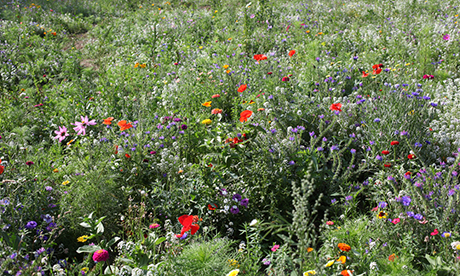Hackney Council says it spent over £11,000 on seeds for London Fields wildflower meadow

The London Fields wildflower meadow in bloom last year. It is currently being re-seeded, and council workers have been seen spraying it with glyphosate. Photograph: Hackney Council
Hackney Council splurged over £11,000 of public funds on seeds for the London Fields wildflower meadow last year.
The Town Hall today conformed it bought the seeds from company Euroflor for a staggering £11,052.80.
One gardening industry insider who works at local seed supplier Growing Life said the amount seemed excessive.
The wildflower meadow is currently at the centre of a controversy over the spraying of chemical glyphosate, which environmentalists want to see banned.
Hackney fashion designer Katharine Hamnett CBE is convening an emergency meeting this Saturday to raise awareness about widespread use of the pesticide by Hackney Council and its contractor WeedFree.
Last year the Town Hall denied it carried out so-called blanket spraying of streets with the weed killer, claiming its use was targeted and specific, but Ms Hamnett and environmental campaigners say the council “showers” our streets with the chemical.
Official guidance states local authorities should avoid unnecessary use of pesticides and should consider other ways of removing weeds.
Glyphosate has been linked in some studies to infertility, and environmentalists suspect it may be harmful to the ecosystem, though biotech industry bodies insist it is safe.
The irony of a commercial weed killer being used to help grow wildflowers has not been lost on opponents of the chemical.
Hackney Council says the London Fields wildflower meadow, Hackney’s “biggest urban meadow”, is a “haven for birds, insects and other wildlife”.
Related:
Fashion designer Katharine Hamnett CBE calls on Hackney Council to ban glyphosate

If glyphosate is so harmful why do the wildflowers on London fields grow so well?
The issue is human health risk.Glyphosate causes birth defects and has been known to since before it was licensed for use( see links on our website).It is not just sprayed in the park, and on the streets and pavements all over the UK, but also in the playgrounds.It should be banned immediately.Paris is pesticide free, why can’t Hackney be???
the US Environmental Protection Agency does not agree with katherine hamnett cbe’s assessment of glyphosate, and has approved it for 40 years.
this does not invalidate the question, “Paris is pesticide free, why can’t Hackney be???” perhaps hackney should be pesticide/herbicide free, and hackney should be able to justify its decision
but very selective and potentially misleading use of studies does not make a strong or credible foundation for the debate.
Yes indeed glyphosate does have EA and EPA approval. However for many many years DDT, also manufactured by Monsanto, had EPA approval. It was subsequently revealed to be highly toxic. The toxicity of glyphosate is very simply demonstrated by its ability to kill all plant life. This surfectant that is nearly always combined with glyphosate to get it to stick to the plants has been revealed in some studies to be even more harmful than the active ingredient. It well worth exercising caution when dealing with human health and the environment. It is not as if no non-toxic alternatives exist to indiscriminate use of herbicides.
Many pesticides have been officially approved as being safe over the years only to later be found as unsafe. The most recent example is that of neonicotinoids, touted as safe for bees by the companies that make them and pesticide apologists in general, they have been found to cause harm to bees and other pollinators and have been temporarily banned for use in the EU.
More and more studies are showing that there are genuine health concerns related to the use of glyphosate and more and more countries, cities and towns around the world are restricting and banning its use.
The real point is that it is unnecessary to use it as there are other non toxic controls available. The continued unnecessary use poses a potential threat to human health and ultimately only benefits the companies that make profit from its sale.
This is a great opportunity for Hackney to show that it values its residents health over the profits of pesticide companies. Hackney could and should become a leading light in non chemical weed control and be an example to the rest of the UK.
Come on Hackney you know it makes sense!
@ Sunfish – They don’t ! Go & have a look they’re all dead & the even the grass looks ill . That ‘Wild Meadow ‘ is now a toxic wasteland – bravo Hackney Council on making the shortlist for the Darwin Awards !
So the Council has £11,000 to waste on flower seeds, while 12 GP surgeries are at risk of closing due to cuts!